We all must make decisions.
Whether you’re an employee, a businessperson, or the CEO of the most powerful tech company in the world, you face problems every day that need solving.
Whether the issue is big or small, we all set goals for ourselves, face challenges, and strive to overcome them.
Fortunately, there’s a fundamental approach to solving these real-life problems, one that can consistently lead you to effective and satisfying solutions.
It may take a few days for a small problem, a couple of months for a life problem, or thousands of years for a cosmic problem, but there is never a problem that cannot be solved
– Dan Koe.
This means that rather than feeling as though your life is out of your control, you can take charge and shape the world around you.
Instead of being overwhelmed by the challenges you face every day, you can learn to enjoy them and overcome them.
This article is long because it serves as a comprehensive guide to problem-solving.
To fully digest this article, try this approach:
- Read half of it now
- Bookmark where you stopped
- Set a phone reminder to finish it later
Now, let’s get started.
Why Most People Are Ineffective Problem Solvers
Several common attitudes can hinder effective problem-solving. And it is exhibited in these four characters. You might have met one or all of them when facing your challenges.
Person 1: Miss Give-Up
Miss Give-Up is the kind of person who gives up immediately whenever she faces even the smallest challenge.
She just sighs and says, “I’ll never be able to do that.” This does not mean that she couldn’t achieve things if he tried. Sometimes she has a great idea or notices a problem that can be fixed.
But Miss Give-Up is terrified of failing and having people laugh at her. Instead of speaking up or taking action, she sits around feeling sorry for herself.
Miss Give-Up can’t take control of her own life. She feels as though no one understands her, and she blames anything bad that happens on everybody else.
Repeatedly, she says the same kinds of things:
- “I’ll never be able to do that. I’m just not that talented.”
- “I’m not going to try. What if I fail? Everyone will make fun of me.”
- “Nobody understands me. Nobody cares about me. Everybody is out to get me.”
Person 2: Mr. Fault Finder
Mr Fault Finder, on the other hand, is never afraid to speak up.
He is a professional critic. Whatever the plan, he is ready to point out the shortcomings and shoot down everyone else’s ideas. If someone tries something and fails, he’ll be the first to say, “I told you so.”
Mr Fault Finder is always eager to blame someone else whenever things go wrong.
He may have a lot to say about other people’s mistakes, but he never does much of anything himself.
Mr. Fault Finder says things like:
- “Come on, I told you what you needed to do. Why can’t you get it done?”
- “Well, that won’t work. What a stupid idea!”
- “I told you that it would get screwed up. It’s all your fault.”
Person 3: Miss Big-Ideas
Mr. Fault Finder may be a big downer, but Miss Big-Ideas has her head stuck in the clouds.
She loves coming up with new ideas. But it rarely goes beyond that. She never bothers to figure out how to turn her ideas into real plans, and she doesn’t try to get anything done.
Miss Big-Ideas is satisfied just thinking about her great dreams. They’re always better in her head than they would be in reality, anyway.
Miss Big-Ideas has many audacious dreams – dreams that never seem to become realities:
- “I want to write a novel!”
- “Wouldn’t it be great if I started my own business?”
- “I’m an ideas person. Don’t bother me with the tiny details!”
Person 4: Mr. Just-Do-It
Mr. Just-Do-It may not seem like a non-problem solver when you first meet him.
He’s not one to worry about problems or entertain negative thoughts. And when something goes wrong, he quickly jumps into action. His attitude is “I can’t change the past. But I can do something now.”
Mr. Just-Do-It’s tenacity and proactiveness are positive traits.
However, if he knew how to pause and think for a minute before rushing to execute, he would be able to achieve so much more. He also tends to blame every failure on a simple lack of effort and thinks any problem can be solved by trying harder.
When he makes up his mind about how to solve a problem, he refuses to change course. He’s not interested in seeking out the root cause of his problems or in considering alternative solutions. He just doesn’t realise that stopping to think can be just as important as taking action.
Mr. Just-Do-It can often be heard saying things like:
- “I’ll never give up. I’ve got to overcome this challenge!”
- “I know this will work if I just put in a little more effort.”
- “Why stop to think? That’s just a waste of time. Everything is about execution!”
Are you one of these types?
Do you ever find yourself sighing and giving up?
Which do you think is easier? To criticise other people or try to do anything on your own?
Do you love to dream but hate to plan? Or do you attack problems head-on but fail to turn on the brakes when you aren’t getting anything done?
Most importantly, are you more like a problem solver?

Which one of these types do you want to be?
Essentials of The Problem Solver
The Problem solver has a real flair for setting goals and getting things accomplished.
By striking a balance between thinking and acting, they can accomplish amazing things. Problem solvers enjoy learning from their successes as well as from their failures.
The toolkit of a Problem solver includes identifying the root cause of a problem and setting specific goals. They have positive attitudes and stay focused on what can be changed rather than what has already happened.
The Problem solver comes up with specific action plans to fix their problems and then executes them right away. Once they act, they constantly monitor their own progress.
Problem-solving isn’t a talent that some people have and others don’t. It’s a habit. By developing the right skills and adopting the right attitude, anyone can become a problem-solver.
What is Problem Solving?
Problem solving is a process that can be broken down into four steps:
- Understand the current situation
- Identify the root cause of the problem
- Develop an effective action plan and
- Execute until the problem is solved, making modifications as necessary.
All you have to do is understand the situation, identify the root cause, develop an effective plan, and execute.
Even if the problem you face is big and complicated, if you learn how to break it down into smaller, manageable problems, you will be able to solve it.
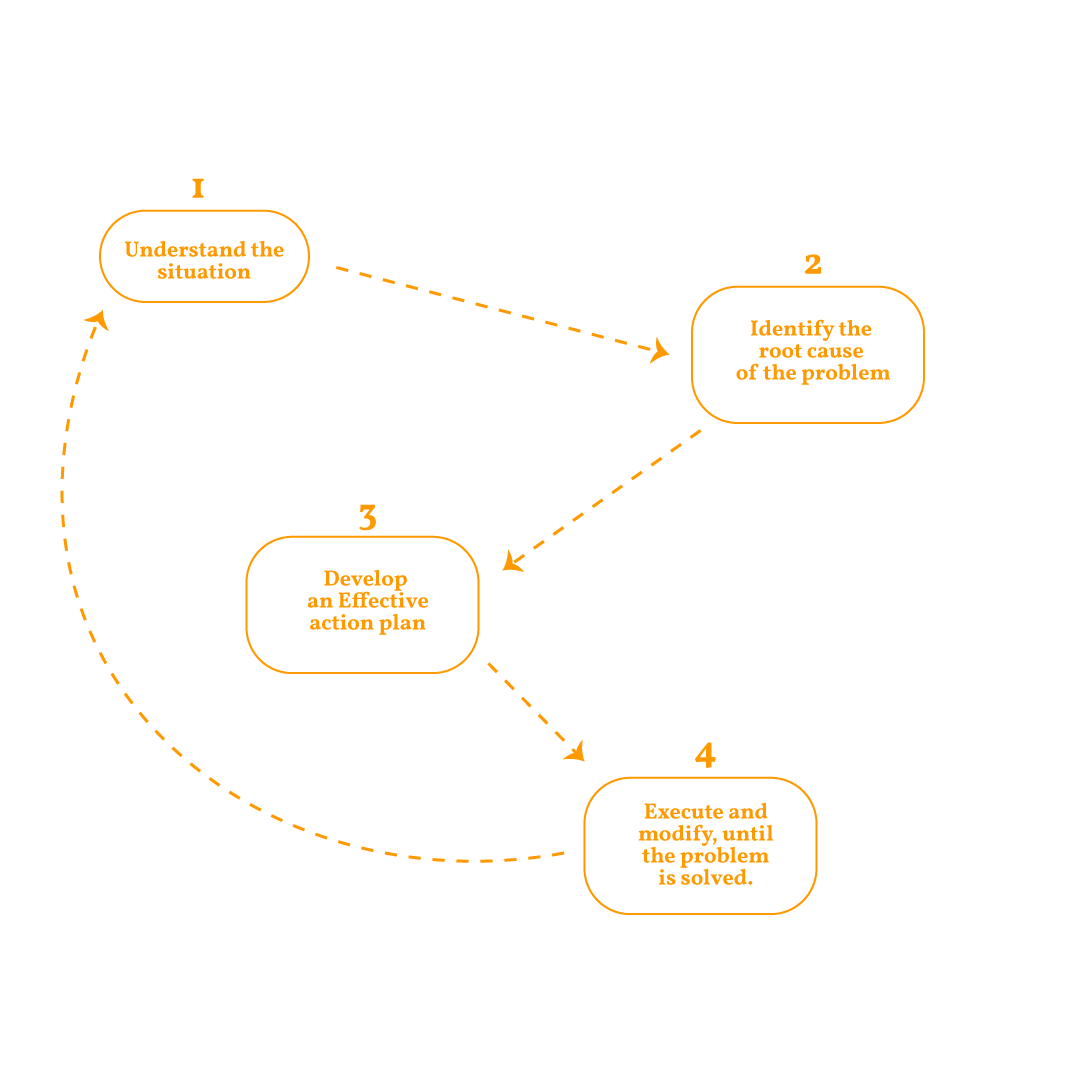
The Four Steps of an Effective Problem Solver
Once you learn the basic problem-solving approach, you can stop panicking and gain the confidence to solve any problems that you face in life, whether they are about work, business, or your personal life.
I will share some toolboxes that help you in each step of solving problems
PROBLEM-SOLVING TOOL-BOX: LOGIC TREE
A logic tree is a great tool to use when you solve problems. It’s a visual tool that helps when you are trying to identify all the potential root causes of a problem and generate a wide variety of solutions.
The key to making a useful logic tree is to break down a problem into categories without leaving anything out. And to group similar items under the same branch.
For example, here is how to use the logic tree to solve a problem like selecting a career path to take after undergraduate studies.
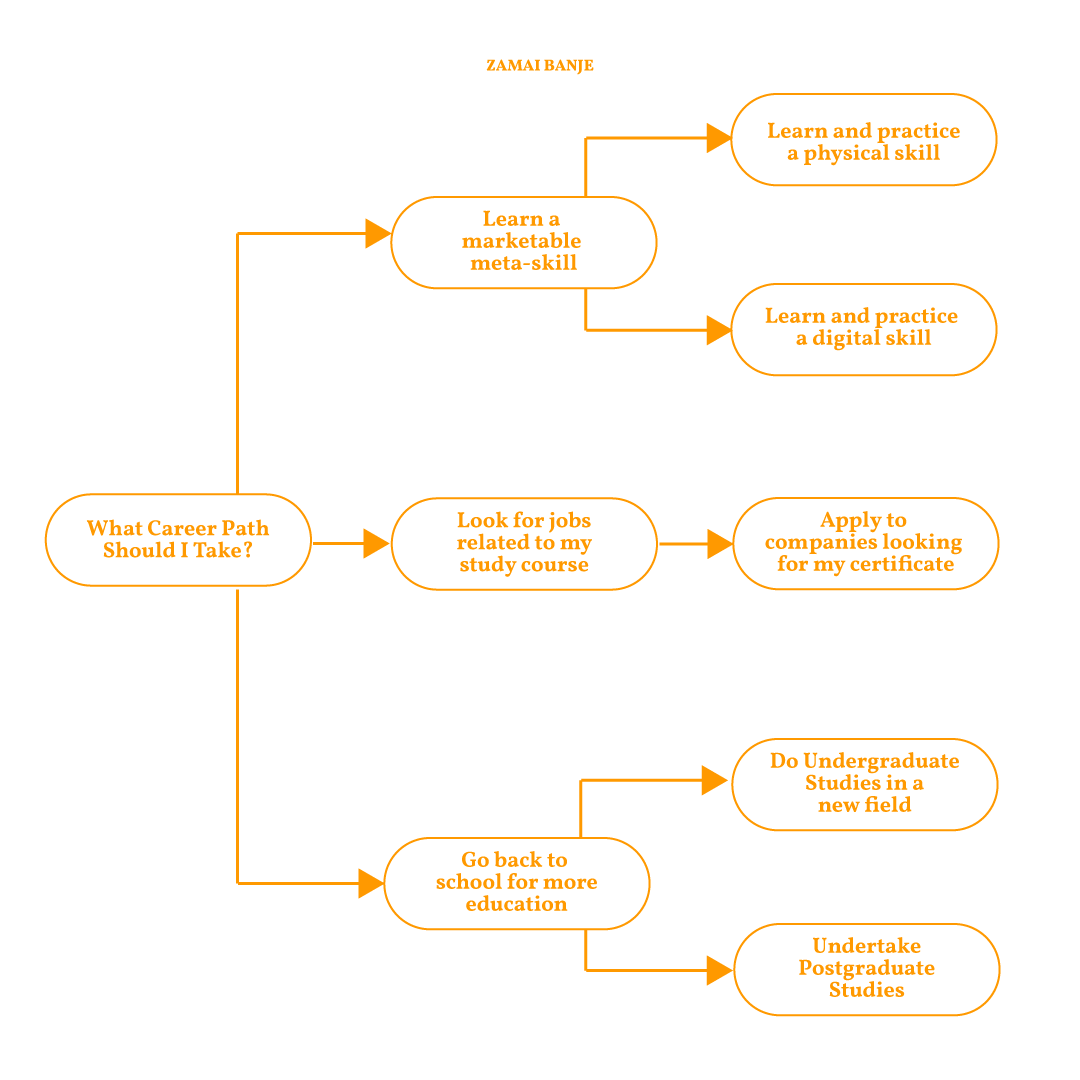
Logic Tree: A Toolbox of a Problem Solver
It may take you a while to get the knack for making logic trees, but once you master it, it will help you to think beyond the initial spark of an idea and lead you to come up with new and effective solutions to your problems.
How to Identify Root Causes of Problems
Life is full of challenges.
You face obstacles as you try to accomplish your goals and dreams. Even the problems that pop up in your daily life can be overwhelming.
But that doesn’t mean you should just give up! Instead, try stepping back and figuring out the root cause of the problems and how you can overcome them.
And here are the steps to do it.
Step 1: Diagnose the situation and identify the root cause of the problem.
- List all the potential root causes of the problem.
- Develop a hypothesis for the likely root cause.
- Determine the analyses and information required to test the hypothesis.
- Analyze and identify the root cause.
Step 2: Develop the solution.
- Develop a wide variety of solutions to solve the problem.
- Prioritize actions.
- Develop an implementation plan.
PROBLEM-SOLVING TOOL-BOX: YES/NO TREE
You can use a yes/no tree to help you figure out a problem’s root cause or decide how to solve a problem.
To create one, you answer multiple yes/no questions. Write down a question and then consider whether a yes or no answer will lead to an explanation (a bucket) or another question.
Repeat this process for each further question until you’ve created buckets for all the possible explanations.
For the problem of selecting a career path to take after undergraduate studies, here is the yes/no tree for one of its potential solutions.

Yes/No Tree
1B. Develop a Hypothesis for the Likely Root Cause
A hypothesis is a hunch. It’s what you think is the most likely explanation for your problem, but you haven’t yet confirmed it.
By determining your hypothesis and thinking through the reasoning that underlies it, you will be able to check whether it’s right.
From there, you can move on to making a sound decision that will lead to a productive solution.
1c. Determine the Analyses and Information Required to test the Hypothesis
This is where the information collection and analysis part of the problem-solving process comes into play.
You’re not collecting information just for the sake of collecting it or analysing it just for fun. You’re doing it to help you make better decisions.
Try to collect and analyse information efficiently and effectively. This will help you make better use of your limited time and resources.
PROBLEM-SOLVING TOOL-BOX: Problem-solving Design Plan
If you start collecting and analysing data without first clarifying the question you are trying to answer, you’re probably doing yourself more harm than good.
You’ll end up drowning in a flood of information and realise only later that most of that research was a waste of time.
To avoid this problem, you should develop a problem-solving design plan before you start chasing after information.
In the design plan, you clarify the issues you are trying to solve, state your current hypotheses and rationale, and list the analyses, actions, and information required to prove or disprove those hypotheses.
Developing this plan before you start researching will drastically increase your problem-solving productivity.
Here is an example of the design plan for the problem we have used as an example.
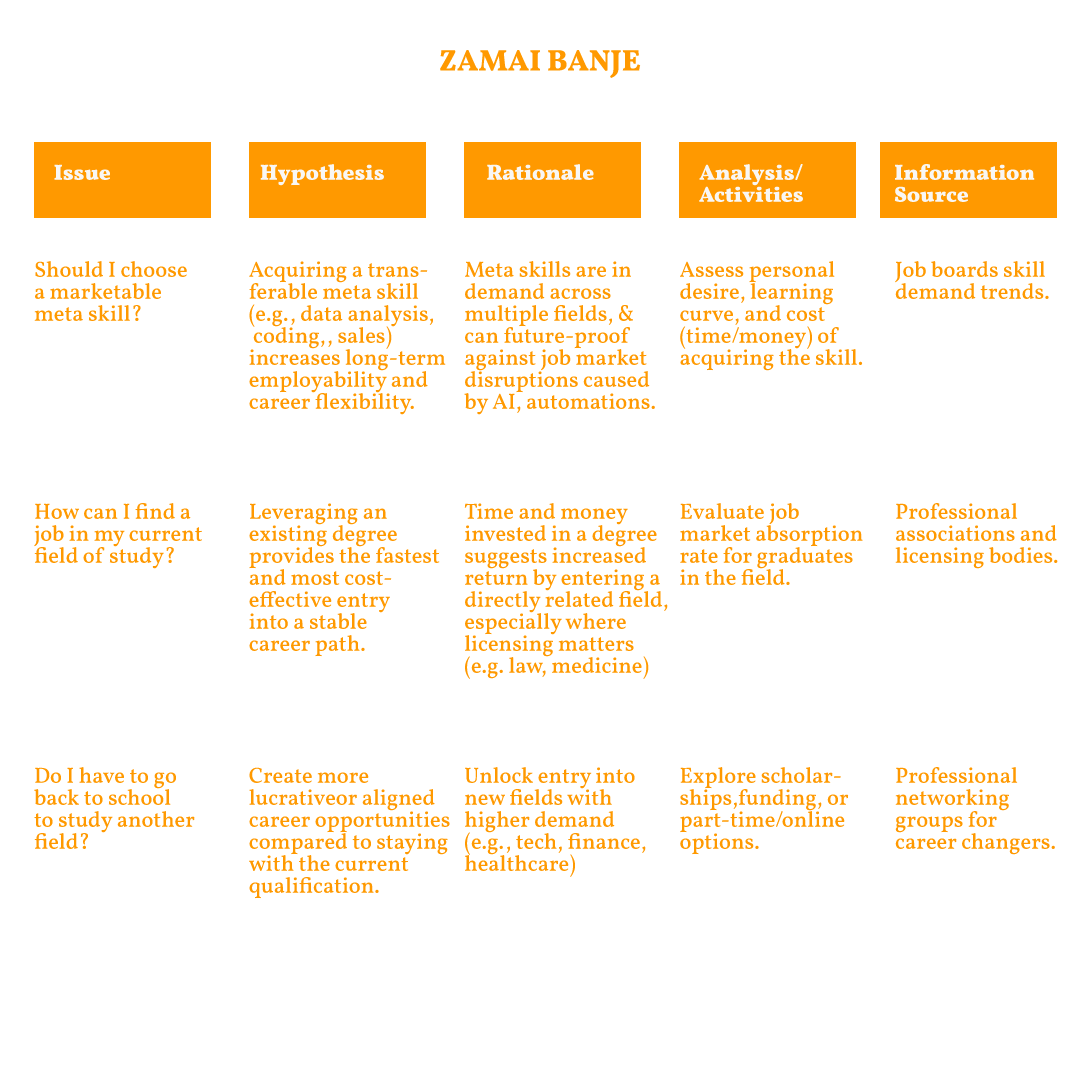
Design Plan: A Toolbox of a Problem Solver
Additionally, putting your plan down on paper will not only clarify your thoughts.
If you’re working in a group, this plan will also help your team focus on what needs to be done and provide the jumping-off point for your group brainstorming. You will be able to focus on only what you really need to know to decide.
When to Prioritize the Actions to take
Make the key criteria the potential impact of the action and its ease of implementation.
Rate the impact, from high to low, on the vertical axis. On the horizontal axis, plot the ease of implementation, from hard to easy.
The best solutions fall in the top right box, with high impact and easy implementation. The least effective solutions fall in the lower left box, with low impact and hard implementation.
Still on the problem of which career path to take immediately after school, here is what the matrix might look like when prioritising which actions to take.
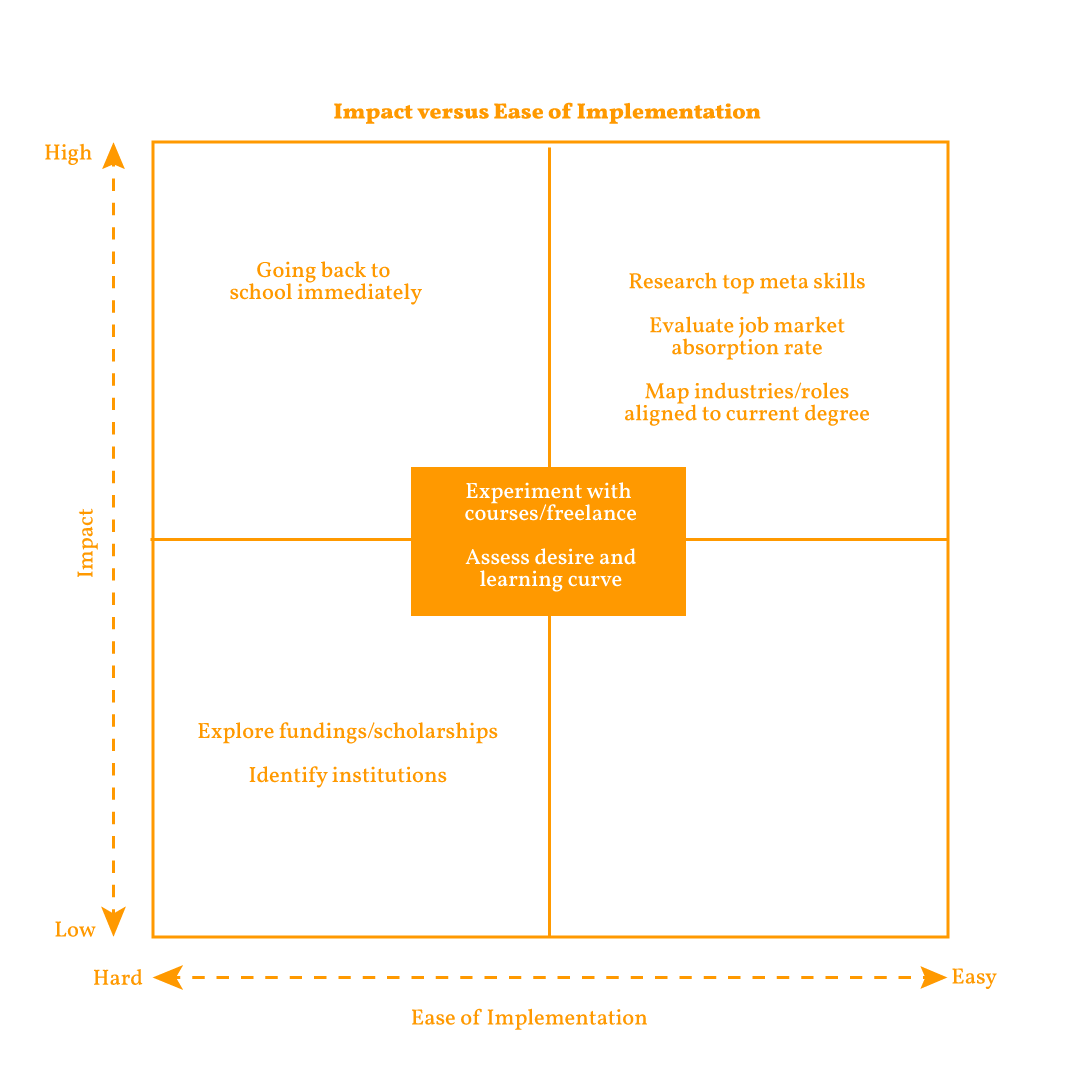
Then, You Develop an Implementation Plan
Your priority should be the actions in the top right box because their impact is high and the ease of implementation is easy. The next priorities are the actions in the top left or bottom right boxes. The least attractive are the ones in the bottom left box.
People have different strengths. You can accomplish more by collaborating with others who have strengths you may lack.
Your Goals and Achievements are Simply Problems that Need Solving
Problem solvers don’t just have big dreams; they go after their larger goals by breaking them down into smaller milestones.
They ask themselves, “What should I do this year, or in the next three months, or today?” These milestones guide problem solvers toward their dreams and help to keep them motivated.
Once they lay out a plan for achieving a dream, they then figure out the most effective way to achieve each smaller goal and to take the actions needed.
There’s a proven process for a problem solver for figuring out how to achieve such a goal.
- Set a clear goal.
- Determine the gap between the goal and the current situation.
- Form a hypothesis about how to close the gap and achieve the goal.
- List as many options and ideas as possible.
- Select the best ideas as the hypothesis.
- Check the hypothesis. Go back to step 3 if the hypothesis is disproved.
- Determine the analyses and information required to test the hypothesis.
- Analyze and develop an action plan.
Step 1: Set a Clear Goal
Bad examples of setting goals are “I want a laptop”; “buy a laptop.”
A good example is: “I want to buy a 700k used Dell laptop within six months without borrowing money from others.”
The first two examples are unclear. It doesn’t clearly state what you want, when you want it, or how you want to obtain it. In the third example, these details are clarified.
If you have specific conditions for achieving your goal, you should include them in the goal statement. The more specific the goal is, the more specific the action plan will be.
Whenever you set a goal, get into the habit of asking yourself,
- What specifically do I want to achieve?
- When do I want to achieve it?
- What specific conditions do I have?
Step 2: Determine the Gap Between the Goal and Current Situation
Once you set a clear goal, you need to identify the gap between your goal and your current situation.
If the gap is small, the solution may be obvious. But if the gap is large, you may have to really think through how to achieve the goal.
Step 3: Form a Hypothesis
3A. List as many options and ideas to close the gap as possible
Take a moment to list a few ideas. Be as specific as possible.
What did you come up with? Were you able to think of a wide variety of ideas? Sometimes it’s hard to break out of your current way of thinking and come up with innovative ideas.
However, by using the logic tree, you will be able to come up with a wide variety of more specific ideas.
To make the tree grow vertically, repeatedly ask yourself, “Are there other ways of solving the problem?”
You can grow the tree horizontally by asking, “Specifically, how or what falls into this category?”
In this manner, you’ll end up developing a wide variety of specific ideas.
3B. Select the best ideas as your hypothesis
Once you create your logic tree, start to look for the best ideas so you can come up with a hypothesis for how you can close the identified gap.
You can cut a branch out of your logic tree if the idea is clearly not effective or feasible, or if it goes against your values.
When you set a clear hypothesis and rationale, you are more able to collect information and conduct analyses efficiently and discover if your hypothesis is true.
PROBLEM-SOLVING TOOL-BOX: Hypothesis Pyramid
The hypothesis pyramid is a great tool for structuring your argument.
Using it to clarify your conclusion and rationale before diving into data collection and analysis will improve your productivity dramatically.
It’s also useful for communicating your hypothesis to others. The basic structure places the conclusion or main message at the top and lists the supporting rationales on the bottom, like the supporting bricks of a pyramid.
There are two main types of hypothesis pyramid: the grouping structure and the argument structure.
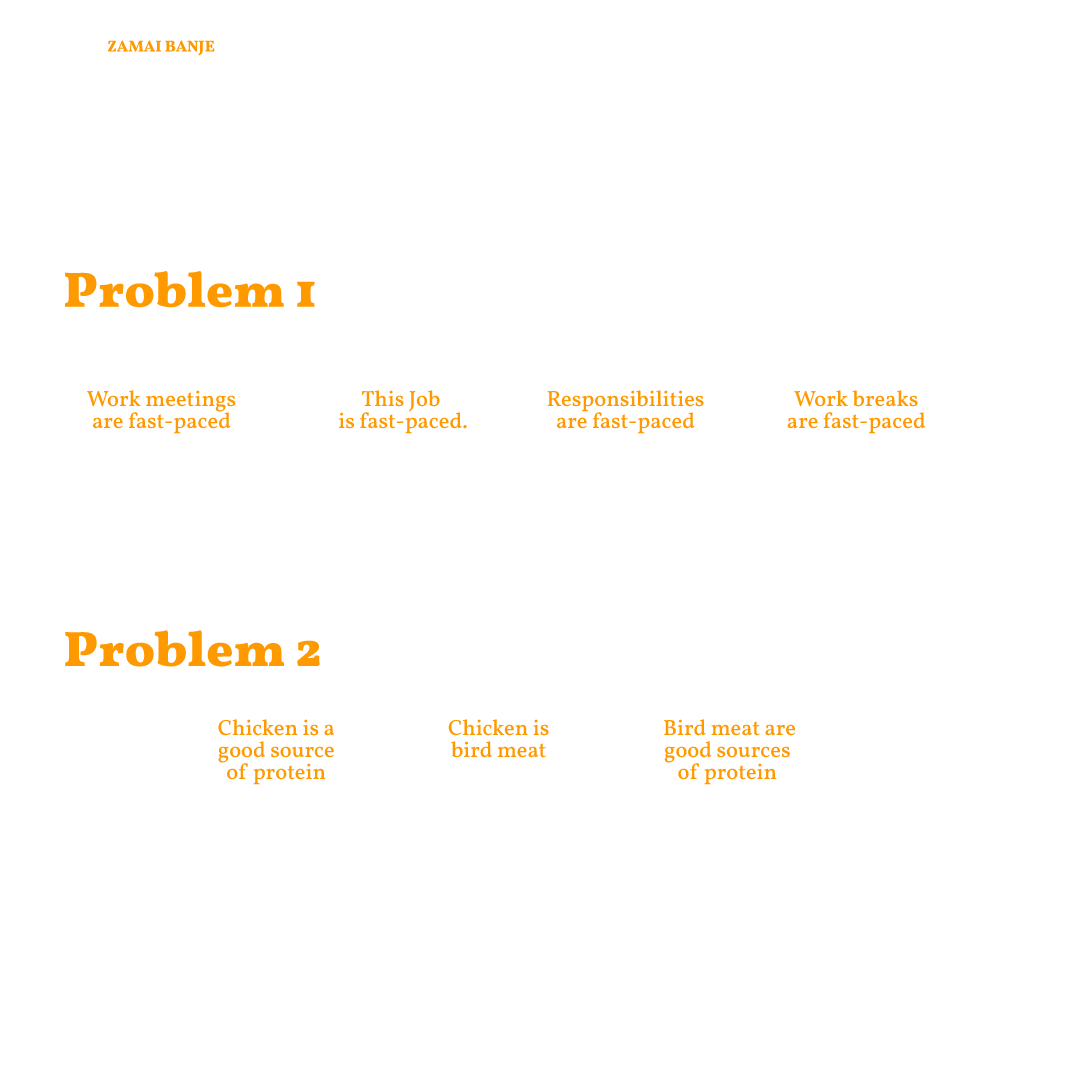
The Problem
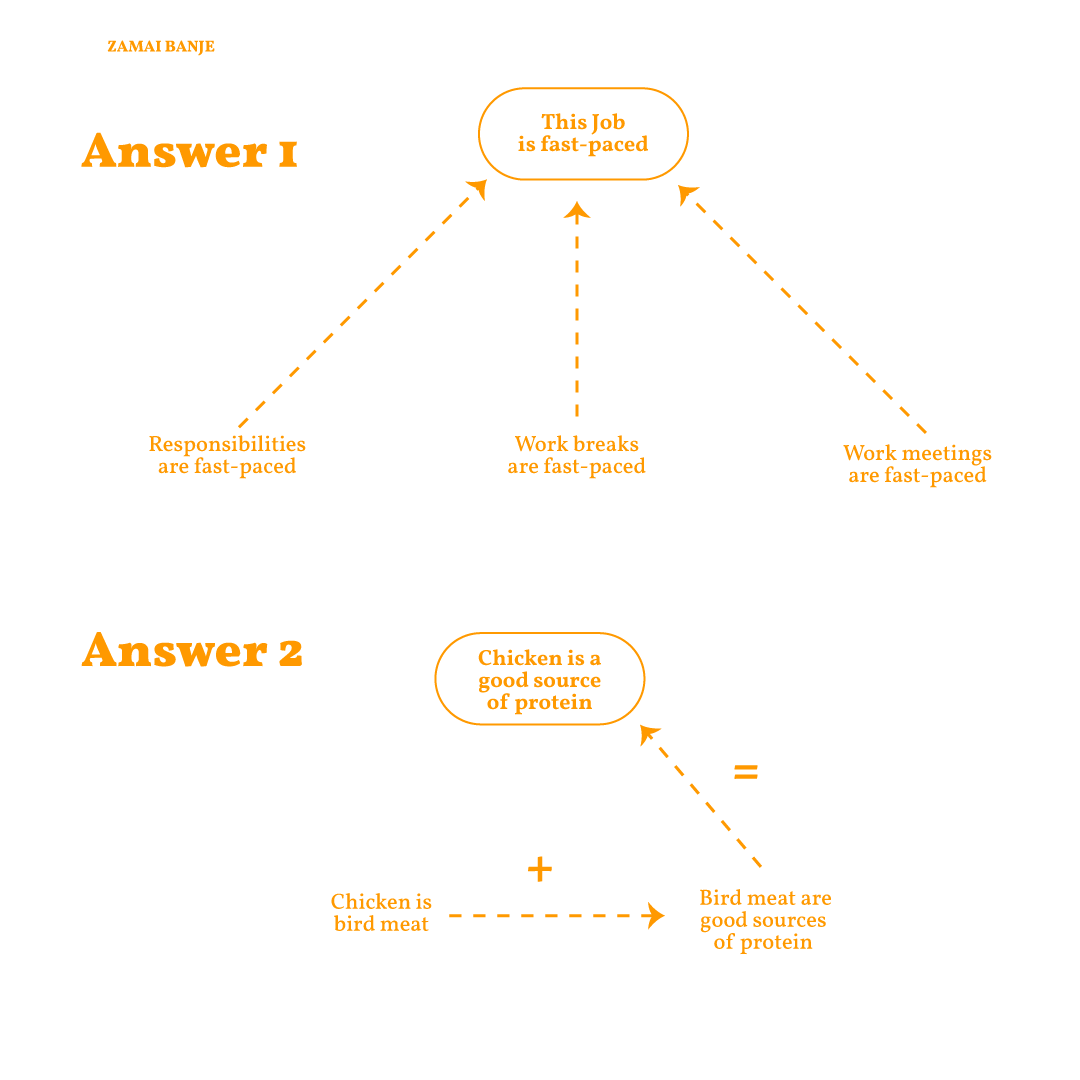
The answers using a Hypothesis Pyramid
Step 4: Check the hypothesis
4A: Determine the analysis and information required to test the hypothesis.
Once you come up with a hypothesis for how your will achieve your goal, your next step is to figure out what analyses and information will be required to test your hypothesis.
4B: Analyze and develop an Action Plan
The Most Critical Step is Execution.
You have worked all the way through the process from the beginning of this guide. You set a clear goal, figured out the gap between your goal and your current situation, formed hypotheses on how you could close that gap, and checked your hypotheses to make sure they would work.
Now you have reached the most critical step: execution.
The impact of your actions is determined by the following equation:
Impact = plan effectiveness x quality of execution
To achieve the most impact, you need to have an effective plan and great execution. If you have one but not the other, you won’t be able to reach your goal. You need both.
Once you have a concrete plan of action to achieve your goal, don’t forget to create a concrete schedule. Write down everything you are going to do, and when you plan to do it.
Remember to monitor your progress and revise your plan as necessary. Very few things in life ever go as perfectly as planned.
How to Correctly Weigh the Pros and Cons of Your Decisions
The Problem solver is a great decision-maker.
They rarely regret their choices because they take the time beforehand to consider all their options and figure out the best decision for them personally.
PROBLEM-SOLVING TOOL-BOX: Pros and Cons: Criteria and Evaluation
Two tools are very helpful when you need to evaluate multiple options and select the best one.
Tool 1: Pros and Cons
The first tool is called pros and cons. This tool helps you broaden your options and ensures that you consider both the good aspects (pros) and bad aspects (cons) before making a final decision.
Step 1: List All the Options
Step 2: List the Pros and Cons of Each of the Options
Next list all the pros and cons of each of the options. Even if you think a certain option is the most attractive, get into the habit of asking yourself, “Aren’t there negative aspects? Are there other positive aspects?”
We tend to be swayed by our first impressions.
If we first think something is attractive, we tend to try to collect evidence that supports that idea. On the other hand. if we think something is unattractive, we tend to highlight only its negative points.
It is critical to avoid this tendency to make a sound decision.
Step 3: Weight each of the positive and negative points you listed
Not all the arguments for or against each choice have the same importance. The next step is to assign a weight to each of the items.
Step 4: Select the Most Attractive Option
Tool 2: Criteria and Evaluation
The next tool is the criteria and evaluation. You can use this tool to clarify which criteria, or qualifications, you should use to evaluate your options and decide the importance of each set of criteria. and effectively evaluate your options.
- List All the Options
- List the Evaluation Criteria
- Decide the Degree of importance of each criterion
You can use three levels, like high, medium, and low, or you can use a 10-point scale.
Step 4: Evaluate Each Option Based on the Weighted Criteria
Step 5: Select the Most Attractive Option
Solving Problems Effectively Will Ultimately Change Your Life
Spend less time worrying about things and more time thinking about actions you can take to get closer to your goals, then actually take action. Be a problem solver.
Ask for advice. You don’t have to figure everything out on your own. Look for information to help you make the best decision in the given time.
Challenge your thinking processes and your conclusions.
Ask the following questions:
- What are the pros and cons? Do I have the full list? Which option looks more attractive considering both the pros and the cons? Are the pros and cons really pros and cons? What actions could I take to enhance the pros and to minimize or eliminate the cons?
- What are the specific criteria I should be using? Do I have the right ones? Am I weighing each criterion the right way?
- Is my evaluation correct? What information am I basing my evaluation on? Is it accurate, up-to-date, and unbiased?
- What actions could I take to improve the attractiveness of my options?
Problem-solving is easy when you know how to set a clear goal, figure out how to reach it, and follow through while reviewing your progress and making changes to your plan as necessary.
If you develop a habit of being a problem solver, you’ll be able to make the most of your talents and take control of your life.
You can solve not only your own problems, but the problems of your work, your business, and your community – and maybe even the world.
N.B: This article is largely inspired and takes a lot of its source material from the book, Problem Solving 101 by Ken Watanabe.
Whenever you’re ready, there are 3 ways I can help you:
- Become Your Highest Self: Every Sunday, I share actionable tips from successful people on how to master money, mindset and meaning. (Please confirm your subscription on the first mail received so the newsletter does not go to junk.)
- Fast Track Book: Stay relevant, master new skills, and be ready for whatever life throws at you. This is the complete roadmap to speed up your learning process and expand the opportunities available to you. Available on Amazon.
- Personal Wealth Maximizer: Take control of your finances and build financial freedom. The Personal Wealth Maximizer give you the exact knowledge and tools to break free from money struggles and build financial confidence.






